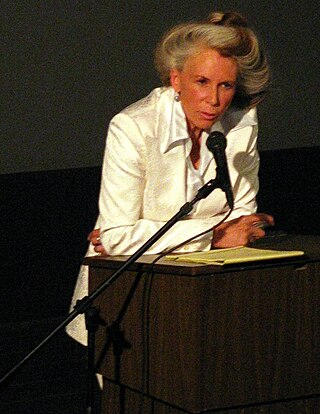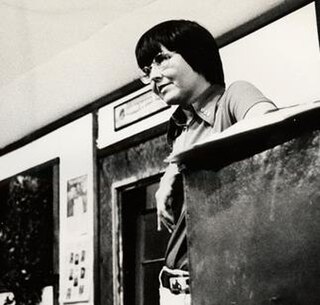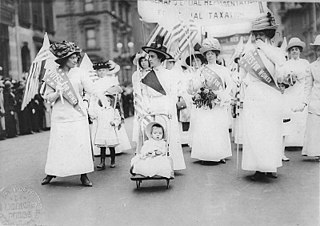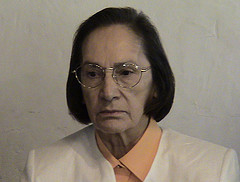Feminism is a range of socio-political movements and ideologies that aim to define and establish the political, economic, personal, and social equality of the sexes. Feminism holds the position that modern societies are patriarchal—they prioritize the male point of view—and that women are treated unjustly in these societies. Efforts to change this include fighting against gender stereotypes and improving educational, professional, and interpersonal opportunities and outcomes for women.
The history of feminism comprises the narratives of the movements and ideologies which have aimed at equal rights for women. While feminists around the world have differed in causes, goals, and intentions depending on time, culture, and country, most Western feminist historians assert that all movements that work to obtain women's rights should be considered feminist movements, even when they did not apply the term to themselves. Some other historians limit the term "feminist" to the modern feminist movement and its progeny, and use the label "protofeminist" to describe earlier movements.
Sex-positive feminism, also known as pro-sex feminism, sex-radical feminism, or sexually liberal feminism, is a feminist movement centering on the idea that sexual freedom is an essential component of women's freedom. They oppose legal or social efforts to control sexual activities between consenting adults, whether they are initiated by the government, other feminists, opponents of feminism, or any other institution. They embrace sexual minority groups, endorsing the value of coalition-building with marginalized groups. Sex-positive feminism is connected with the sex-positive movement. Sex-positive feminism brings together anti-censorship activists, LGBT activists, feminist scholars, producers of pornography and erotica, among others. Sex-positive feminists believe that prostitution can be a positive experience if workers are treated with respect, and agree that sex work should not be criminalized.

Catharine Alice MacKinnon is an American feminist legal scholar, activist, and author. She is the Elizabeth A. Long Professor of Law at the University of Michigan Law School, where she has been tenured since 1990, and the James Barr Ames Visiting Professor of Law at Harvard Law School. From 2008 to 2012, she was the special gender adviser to the Prosecutor of the International Criminal Court.

Mary Daly was an American radical feminist philosopher and theologian. Daly, who described herself as a "radical lesbian feminist", taught at the Jesuit-run Boston College for 33 years. Once a practicing Roman Catholic, she had disavowed Christianity by the early 1970s. Daly retired from Boston College in 1999, after violating university policy by refusing to allow male students in her advanced women's studies classes. She allowed male students in her introductory class and privately tutored those who wanted to take advanced classes.
Postmodern feminism is a mix of postmodernism and French feminism that rejects a universal female subject. The goal of postmodern feminism is to destabilize the patriarchal norms entrenched in society that have led to gender inequality. Postmodern feminists seek to accomplish this goal through opposing essentialism, philosophy, and universal truths in favor of embracing the differences that exist amongst women in order to demonstrate that not all women are the same. These ideologies are rejected by postmodern feminists because they believe if a universal truth is applied to all women of society, it minimizes individual experience, hence they warn women to be aware of ideas displayed as the norm in society since it may stem from masculine notions of how women should be portrayed.

Erika Lust is a Swedish feminist pornographic film director, screenwriter and producer. Since the debut of her first indie erotic film The Good Girl in 2004, Lust has been cited as one of the current leading participants in the feminist pornography movement, asserting that an ethical production process sets her company apart from mainstream pornography sites.

Julie Bindel is an English radical feminist writer. She is also co-founder of the law reform group Justice for Women, which has aimed to help women who have been prosecuted for assaulting or killing violent male partners.

Jessica Valenti is an American feminist writer. She was the co-founder of the blog Feministing, which she wrote for from 2004 to 2011. Valenti is the author of six books: Full Frontal Feminism (2007), He's a Stud, She's a Slut (2008), The Purity Myth (2009), Why Have Kids? (2012), Sex Object: A Memoir (2016), and Abortion: Our Bodies, Their Lies, and the Truths We Use to Win (2024). She also co-edited the books Yes Means Yes: Visions of Female Sexual Power and A World Without Rape (2008), Believe Me: How Trusting Women Can Change the World (2020). Between 2014 and 2018, Valenti was a columnist for The Guardian. She currently runs the Abortion, Every Day newsletter on Substack. The Washington Post described her as "one of the most successful and visible feminists of her generation".

Feminism is aimed at defining, establishing, and defending a state of equal political, economic, cultural, and social rights for women. It has had a massive influence on American politics. Feminism in the United States is often divided chronologically into first-wave, second-wave, third-wave, and fourth-wave feminism.
Feminist views on pornography range from total condemnation of the medium as an inherent form of violence against women to an embracing of some forms as a medium of feminist expression. This debate reflects larger concerns surrounding feminist views on sexuality, and is closely related to those on prostitution, BDSM, and other issues. Pornography has been one of the most divisive issues in feminism, particularly in Anglophone (English-speaking) countries. This division was exemplified in the feminist sex wars of the 1980s, which pitted anti-pornography activists against pro-pornography ones.
Feminist pornography, also known by other terms in internet such as 'ethical porn' or 'fair-trade porn' is a genre of film developed by or for those within the sex-positive feminist movement. It was created for the purpose of promoting gender equality by portraying more bodily movements and sexual fantasies of women and members of the LGBT community.
Feminist views on transgender topics vary widely.
Feminist views on sexuality widely vary. Many feminists, particularly radical feminists, are highly critical of what they see as sexual objectification and sexual exploitation in the media and society. Radical feminists are often opposed to the sex industry, including opposition to prostitution and pornography. Other feminists define themselves as sex-positive feminists and believe that a wide variety of expressions of female sexuality can be empowering to women when they are freely chosen. Some feminists support efforts to reform the sex industry to become less sexist, such as the feminist pornography movement.
Porn for women, women's porn or women's pornography is pornography aimed specifically at the female market, and often produced by women. It rejects the view that pornography is only for men, and seeks to make porn that women enjoy watching instead of what is being offered in male-centric mainstream pornography.
Feminism in Argentina is a set of movements aimed at defining, establishing, and defending equal political, economic, and social rights and equal opportunities for women in Argentina. Although some women have been considered precursors—among them Juana Manso and Juana Manuela Gorriti—feminism was introduced to the country as a result of the great European immigration wave that took place in the late 19th and early 20th century. The first feminists did not form a unified movement, but included anarchist and socialist activists, who incorporated women's issues into their revolutionary program, and prestigious freethinker women, who initially fought for access to higher education and, later, legal equality with men. The early 20th century was also full of women fighting for their freedom and rights in the workplace. Despite the efforts of the first-wave feminists, Argentine women did not acquire the right to vote until 1947, during Juan Perón's first government. His highly popular wife, Eva, championed women's suffrage and founded and ran the nation's first large-scale female political party, the Female Peronist Party. Although she refused to identify herself as a feminist, Eva Perón is valued for having redefined the role of women in politics.

Esperanza Brito de Martí was a Mexican journalist, feminist and reproductive rights activist. She was the director of Fem magazine for nearly 30 years and wrote as a correspondent for several newspapers and magazines. Her journalism was honored with the National Journalism Prize "Juan Ignacio Castorena y Visúa". She was an advocate for both contraception and abortion rights. Through her many activities, she co-founded the Coalición de Mujeres Feministas, the Movimiento Nacional de Mujeres and pressed for the founding of the first Rape Crisis and Guidance Center (Coapevi), first agency for dealing specifically with sexual crimes, first Center for Domestic and Sexual Violence (NOTIFY). In 1998, the first Center for Support of Women which was named after her was opened.
Fourth-wave feminism is a feminist movement that began around the early 2010s and is characterized by a focus on the empowerment of women, the use of internet tools, and intersectionality. The fourth wave seeks greater gender equality by focusing on gendered norms and the marginalization of women in society.

Eugenic feminism was a current of the women's suffrage movement which overlapped with eugenics. Originally coined by the Lebanese-British physician and vocal eugenicist Caleb Saleeby, the term has since been applied to summarize views held by prominent feminists of Great Britain and the United States. Some early suffragettes in Canada, especially a group known as The Famous Five, also pushed for various eugenic policies.

FiLiA is a British gender-critical feminist charity founded in 2015 that describes itself as part of the women's liberation movement. FiLiA organizes a conference, held first in 2008 as Feminism in London, in different cities, which it now describes as the "largest annual grassroots feminist conference in Europe". FiLiA is gender-critical, and states that it supports "sex-based rights" and opposes what they refer to as "gender ideology." It has lobbied against gender recognition reform and considers gender self-identification a threat to "women's protected rights." Critics describe it as anti-transgender and transphobic. FiLiA is critical of the sex industry and as a result, it considers pornography harmful. It has campaigned on behalf of women internationally, and has held campaigns in countries such as Iran, Cyprus, and Kenya. It has been described as one of "the most important 'gender critical' groups" alongside Women's Declaration International. FiLiA has faced protests and attempted cancellations, notably in 2023 when the venue Platform attempted to cancel the conference due to alleged transphobia. In 2024 FiLiA launched the book The Women Who Wouldn't Wheesht, on what the authors describe as a campaign for "sex-based rights" by J.K. Rowling and others.









